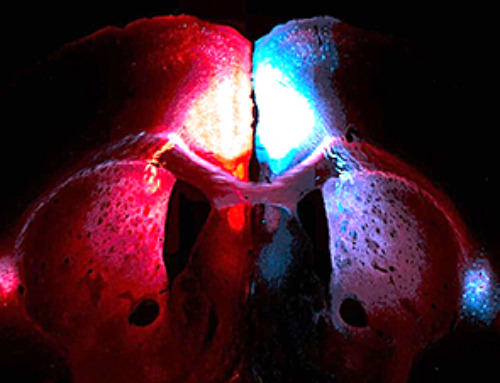A week of lavender-scented nights helped brain surgery patients sleep more deeply, shorten delirium, and feel calmer, pointing to a simple, natural aid for post-surgery care.
A randomized controlled trial investigating the therapeutic impact of lavender essential oil aromatherapy on various postoperative measures revealed improved objective sleep quality (notably on the fourth day). It reduced anxiety on the seventh postoperative day in patients with intracranial tumors. The trial findings are published in Frontiers in Pharmacology.
Background
An intracranial tumor, commonly known as a brain tumor, is an abnormal growth of cells in or around the brain. These tumors can be benign or malignant and can significantly impair brain functions and affect the physical and mental health of affected people. In severe cases, these tumors can be life-threatening.
Surgery is the primary treatment option for intracranial tumors, which are often associated with postoperative neurocognitive dysfunctions and prolonged hospital stay. Sleep disturbances are widely recognized postoperative consequences in patients with intracranial tumors. This is associated with cognitive impairment, increased pain, anxiety, and depression, and delayed postoperative recovery.
Various pharmacological and non-pharmacological interventions are available to improve postoperative sleep quality and neurocognitive functions. However, major disadvantages of pharmacological interventions are adverse side effects, including respiratory distress. Non-pharmacological interventions, including noise reduction, eye masks, and music therapy, on the other hand, exhibit significant individual variability in response. This highlights the need for identifying effective and safe strategies to improve the postoperative health consequences of patients with intracranial tumors.
In this randomized controlled trial conducted at the Sanbo Brain Hospital, China, researchers investigated the therapeutic potential of lavender essential oil inhalation aromatherapy in improving sleep quality and shortening postoperative delirium duration in patients with intracranial tumors.
Lavender essential oil is well-known for its anti-inflammatory, anxiolytic, antidepressant, and sleep-promoting properties. It has been used widely for aromatherapy in hemodialysis patients, burn patients, and those with migraines and insomnia. The current trial aimed to extend the previously recognized anxiolytic and sleep-promoting effects of this aromatherapy in patients with intracranial tumors.
Trial design
The trial involved 42 hospitalized patients who were scheduled for intracranial tumor surgery. The participants were randomly assigned to the intervention group and the control group.
The intervention group patients received inhalation aromatherapy with 10% lavender essential oil, administered via nasal patches at night for seven consecutive days following surgery. The control group patients did not receive any intervention. No placebo or sham control was used, which the authors note as a limitation of this study.
All enrolled patients were evaluated using validated methods for postoperative sleep quality and neurocognitive disorders.
Key findings
The chemical composition of the lavender essential oil was analyzed in the trial to ensure consistency in the chemical profile. The findings revealed the presence of 60 compounds, with linalyl acetate, linalool, and lavandulol acetate being the most abundant and significant compounds.
Postoperative sleep quality
Several sleep quality parameters were analyzed in each study group for seven days after surgery. The findings revealed significantly longer total sleep and deep sleep durations in patients receiving lavender essential oil aromatherapy on the fourth postoperative day only, compared to the control group patients.
Overall, an improved sleep quality was observed among intervention group patients across several postoperative nights; however, a statistically significant improvement was observed only on the fourth day. This observation indicates that repeated exposures to lavender essential oil for several nights are needed to exert a measurable impact on postoperative sleep quality.
The trial findings also revealed significantly shorter sleep latency (the transition from full wakefulness to sleep) and lower sleep apnea severity and frequency of awakenings among intervention group patients compared to the control group patients.
Postoperative neurocognitive disorder
The assessment of various neurocognitive disorders revealed a significantly shorter duration of postoperative delirium among intervention group patients compared to that among control group patients. Delirium is a condition of impaired thinking and awareness that can lead to confusion, memory problems, or hallucinations. However, no significant differences were found between the groups in Mini-Mental State Examination (MMSE) scores one and three months after surgery.
Postoperative mental health outcomes
The trial reported a significant improvement in anxiety on the seventh postoperative day and a non-significant improvement in depression among intervention group patients. The observed improvement in anxiety and sleep quality due to lavender essential oil aromatherapy was more evident in female patients than in male patients. The authors caution that this subgroup finding is exploratory and based on a small sample size.
Significance
The trial findings highlight the significance of postoperative lavender essential oil inhalation aromatherapy in improving sleep quality (particularly on day four), reducing the duration of delirium, and mitigating anxiety in patients with intracranial tumors.
Notably, the trial suggests that this aromatherapy’s postoperative sleep and cognitive benefits are associated with continuous, repeated exposures to lavender essential oil for several nights, indicating that the effect of lavender essential oil may be cumulative. No significant differences were seen in pain, postoperative nausea/vomiting, complications, length of stay, or hospital cost. Further mechanistic research in larger samples is needed to understand the pattern of aromatherapy efficacy better.
The therapeutic properties of lavender essential oil are closely associated with its chemical composition. The formulation used in this trial is characterized by high levels of linalool and linalyl acetate, and low levels of eucalyptol and camphor. Both linalool and linalyl acetate have been found to improve sleep quality by entering the circulatory system through inhalation and altering the GABAergic, cholinergic, histaminergic, and monoaminergic pathways in the limbic system.
The trial reports aromatherapy-mediated reduction in postoperative delirium duration, possibly due to the neuro-modulatory effects of lavender components and their interaction in regulating sleep and cognitive function.
Overall, the trial findings suggest that 10% lavender essential oil is safe for inhalation aromatherapy in the short-term postoperative period and may have clinical implications for improving perioperative sleep, mitigating cognitive impairment, and managing stress.
The authors note that while no adverse events were reported in this study, some literature points to possible route-dependent risks and endocrine effects in other contexts, which warrant further safety studies.
- Liu Y. (2025). Effects of lavender essential oil inhalation aromatherapy on postoperative sleep quality in patients with intracranial tumors: a randomized controlled trial. Frontiers in Pharmacology. https://doi.org/10.3389/fphar.2025.1584998. https://www.frontiersin.org/journals/pharmacology/articles/10.3389/fphar.2025.1584998/full
News
This New Blood Test Can Detect Cancer Before Tumors Appear
A new CRISPR-powered light sensor can detect the faintest whispers of cancer in a single drop of blood. Scientists have created an advanced light-based sensor capable of identifying extremely small amounts of cancer biomarkers [...]
Blindness Breakthrough? This Snail Regrows Eyes in 30 Days
A snail that regrows its eyes may hold the genetic clues to restoring human sight. Human eyes are intricate organs that cannot regrow once damaged. Surprisingly, they share key structural features with the eyes [...]
This Is Why the Same Virus Hits People So Differently
Scientists have mapped how genetics and life experiences leave lasting epigenetic marks on immune cells. The discovery helps explain why people respond so differently to the same infections and could lead to more personalized [...]
Rejuvenating neurons restores learning and memory in mice
EPFL scientists report that briefly switching on three “reprogramming” genes in a small set of memory-trace neurons restored memory in aged mice and in mouse models of Alzheimer’s disease to level of healthy young [...]
New book from Nanoappsmedical Inc. – Global Health Care Equivalency
A new book by Frank Boehm, NanoappsMedical Inc. Founder. This groundbreaking volume explores the vision of a Global Health Care Equivalency (GHCE) system powered by artificial intelligence and quantum computing technologies, operating on secure [...]
New Molecule Blocks Deadliest Brain Cancer at Its Genetic Root
Researchers have identified a molecule that disrupts a critical gene in glioblastoma. Scientists at the UVA Comprehensive Cancer Center say they have found a small molecule that can shut down a gene tied to glioblastoma, a [...]
Scientists Finally Solve a 30-Year-Old Cancer Mystery Hidden in Rye Pollen
Nearly 30 years after rye pollen molecules were shown to slow tumor growth in animals, scientists have finally determined their exact three-dimensional structures. Nearly 30 years ago, researchers noticed something surprising in rye pollen: [...]
NanoMedical Brain/Cloud Interface – Explorations and Implications. A new book from Frank Boehm
New book from Frank Boehm, NanoappsMedical Inc Founder: This book explores the future hypothetical possibility that the cerebral cortex of the human brain might be seamlessly, safely, and securely connected with the Cloud via [...]
How lipid nanoparticles carrying vaccines release their cargo
A study from FAU has shown that lipid nanoparticles restructure their membrane significantly after being absorbed into a cell and ending up in an acidic environment. Vaccines and other medicines are often packed in [...]
New book from NanoappsMedical Inc – Molecular Manufacturing: The Future of Nanomedicine
This book explores the revolutionary potential of atomically precise manufacturing technologies to transform global healthcare, as well as practically every other sector across society. This forward-thinking volume examines how envisaged Factory@Home systems might enable the cost-effective [...]
A Virus Designed in the Lab Could Help Defeat Antibiotic Resistance
Scientists can now design bacteria-killing viruses from DNA, opening a faster path to fighting superbugs. Bacteriophages have been used as treatments for bacterial infections for more than a century. Interest in these viruses is rising [...]
Sleep Deprivation Triggers a Strange Brain Cleanup
When you don’t sleep enough, your brain may clean itself at the exact moment you need it to think. Most people recognize the sensation. After a night of inadequate sleep, staying focused becomes harder [...]
Lab-grown corticospinal neurons offer new models for ALS and spinal injuries
Researchers have developed a way to grow a highly specialized subset of brain nerve cells that are involved in motor neuron disease and damaged in spinal injuries. Their study, published today in eLife as the final [...]
Urgent warning over deadly ‘brain swelling’ virus amid fears it could spread globally
Airports across Asia have been put on high alert after India confirmed two cases of the deadly Nipah virus in the state of West Bengal over the past month. Thailand, Nepal and Vietnam are among the [...]
This Vaccine Stops Bird Flu Before It Reaches the Lungs
A new nasal spray vaccine could stop bird flu at the door — blocking infection, reducing spread, and helping head off the next pandemic. Since first appearing in the United States in 2014, H5N1 [...]
These two viruses may become the next public health threats, scientists say
Two emerging pathogens with animal origins—influenza D virus and canine coronavirus—have so far been quietly flying under the radar, but researchers warn conditions are ripe for the viruses to spread more widely among humans. [...]





















